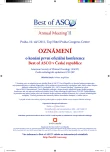-
Medical journals
- Career
Avastin in the Treatment of Breast Cancer
Authors: K. Petrakova
Authors‘ workplace: Klinika komplexní onkologické péče, Masarykův onkologický ústav, Brno
Published in: Klin Onkol 2011; 24(2): 101-105
Category: Reviews
Overview
Over the last decades, various new agents have been developed for the treatment of metastatic breast cancer and overall survival of these patients has increased. The role of chemotherapy in the treatment of metastatic breast cancer is well established. Bevacizumab is a potent antiangiogenic agent active in many solid tumors. Three randomised clinical trials (E2100, AVADO and RIBBON I) proved the benefit of chemotherapy, especially a combination of taxanes and bevacizumab, as the first line treatment of metastatic breast cancer. The combination improved patient progression-free survival in all trials with no impact on the known toxic effects of taxanes. This may be a potent treatment option particularly for patients with triple negative breast cancer, and a potentially less toxic alternative to combination chemotherapy.
Key words:
breast cancer – antiangiogenic agent – bevacizumab
Sources
1. Beslija S, Bonneterre J, Burstein HJ et al. Third consensus on medical treatment of metastatic breast cancer. Ann Oncol 2009; 20(11): 1771–1785.
2. Carrick S, Parker S, Wilcken N et al. Single agent versus combination chemotherapy for metastatic breast cancer. Cochrane Database Syst Rev 2005; 2: CD003372.
3. Belotti D, Vergani V, Drudis T et al. The microtubule-affecting drug paclitaxel has antiangiogenic activity. Clin Cancer Res 1996; 2(11): 1843–1849.
4. Sweeney CJ, Miller KD, Sissons SE et al. The antiangiogenic property of docetaxel is synergic with a recombinant humanized monoclonal antibody against vascular endothelial growth factor or 2-methoxyestradiol but antagonized by endothelial growth factors. Cancer Res 2001; 61(8): 3369–3372.
5. Miller K, Wang M, Gralow J et al. Paclitaxel plus bevacizumab versus paclitaxel alone for metastatic breast cancer. N Engl J Med 2007; 357(26): 2666–2676.
6. Gray R, Bhattacharya S, Bowden C et al. Independent review of E2100: a phase III trial of bevacizumab plus paclitaxel versus paclitaxel in women with metastatic breast cancer. J Clin Oncol 2009; 27(30): 4966–4972.
7. Klence B, Bhattacharya S, Samant M et al. Independent review of E2100 validates progression-free survival (PFS) improvement with the addition of bevacizumab (B) to paclitaxel (P) as initial chemotherapy for metastatic breast cancer (MBC). J Clin Oncol 2008; 26 (Suppl 20): Abstract 1036.
8. Miles DW, Chan A, Dirix LY et al. Phase III study of bevacizumab plus docetaxel compared with placebo plus docetaxel in the first-line treatment of HER-2 negative metastatic breast cancer. J Clin Oncol 2010; 28(20): 3239–3247.
9. Pivot X, Verma S, Thomassen C et al. Clinical benefit of bevacizumab (BV) + first-line docetaxel (D) in eldery patiens (pts) with locally rccurrent (LR) or metastatic breast cancer (mBC):AVADO study. J Clin Oncol 2009; 27: Abstract 1094.
10. Biganzoli L, Cortes-Funes H, Thomssen C et al. Tolerability and efficacy of first-line bevacizumab (B) plus chemotherapy (CT) in eldery patients with advanced breast cancer (sBC): subpopulation analysis of the M019391 study. J Clin Oncol 2009; 27: Abstract 1032.
11. F. Hoffman-La-Roche Ltd. Avastin Summary of Product Characteristics. 2009. Available from: http://www.emea.europa.eu/humandocs/PDFs/EPAR/avastin/emea-combined-h582en.pdf.
12. Hurwitz H, Fehrenbacher L, Novotný W et al. Bevacizumab plus irrinotecan, fluorouracil and leucovorin for the treatment of metastatic colorectal cancer. N Engl J Med 2004; 350(23): 2335–2342.
13. Burzykowski T, Buyse M, Piccart-Gebhart MJ et al. Evaluation of tumor response, disease control, progression-free survival, and time to progression as potential surrogate end points in metastatic breast cancer. J Clin Oncol 2008; 26(12): 1987–1992.
14. Saad ED, Katz A, Buyse M. Overall survival and post-progression survival in advanced breast cancer: a review of recent randomized clinical trials. J Clin Oncol 2010; 28(11): 1958–1962.
15. Brufsky A, Bondarenko IN, Smimov V et al. RIBBON-2: a randomized double-blind, placebo-controlled, phase III.trial evaluating the efficacy and safety of bevacizumab in combination with chemotherapy for second-line treatment of HER-2-negative metastatic breast cancer. Cancer Res 2009; 69 (Suppl 24): Abstract 42.
16. Robert NJ, Dieras V, Glaspy J et al. RIBBON-1randomised, double-blind, placebo-controlled, phase III.trial of chemotherapy with or without bevacizumab (B) for the first-line treatment of HER-2negative locally reccurent or metastatic breast cancer (MBC). J Clin Oncol 2009; 27: Abstract 1005.
17. O’Shaughnessy J et al. Meta-analysis of 3 randomized phase III Trials in previously untreated MBC. J Clin Oncol 2010; 28: Abstract 1005.
Labels
Paediatric clinical oncology Surgery Clinical oncology
Article was published inClinical Oncology

2011 Issue 2-
All articles in this issue
- Treatment of Patients with Relapsed/Refractory Hodgkin Lymphoma
- Metastatic choriocarcinoma in 26-year-old woman – case report
- Comments on the TNM Classification of Malignant Tumours – 7th Edition
- Course and Conclusions of the Interdisciplinary Meeting „Winter GLIO TRACK Meeting“ 2011
- Indication of EGFR Kinase Inhibitors Should Be Refined
- Adjuvant Therapy in Rectal Cancer
- Avastin in the Treatment of Breast Cancer
- Overview of Potential Oncomarkers for Detection of Early Stages of Ovarian Cancer
- Multimodal Treatment of Glioblastoma Multiforme: Results of 86 Consecutive Patients Diagnosed in Period 2003–2009
- Prostate Cancer Incidence and Mortality in Selected Countries of Central Europe
- Angiomyofibroblastoma of the Cervix Uteri: A Case Report
- Phase 0 Clinical Trials Will Overcome Stagnation of Anticancer Drug Development?
- Clinical Oncology
- Journal archive
- Current issue
- Online only
- About the journal
Most read in this issue- Overview of Potential Oncomarkers for Detection of Early Stages of Ovarian Cancer
- Metastatic choriocarcinoma in 26-year-old woman – case report
- Adjuvant Therapy in Rectal Cancer
- Comments on the TNM Classification of Malignant Tumours – 7th Edition
Login#ADS_BOTTOM_SCRIPTS#Forgotten passwordEnter the email address that you registered with. We will send you instructions on how to set a new password.
- Career

